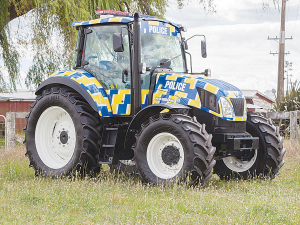Canterbury farmers and Police Association slam proposed rural policing cuts
Canterbury farmers and the Police Association say they are frustrated by proposed cuts to rural policing in the region.
 The Police Association says rural policing has always been challenging, with a wide range of communities covered by rural officers.
The Police Association says rural policing has always been challenging, with a wide range of communities covered by rural officers.
New uniforms and reliable phone coverage are among the support rural police officers require.
That’s according to the results of the Rural Police Enhancement (RPE) Project. According to documents obtained earlier this year under the Official Information Act, NZ Police identified a number of ‘opportunities’ during the project for rural policing to be improved.
Those requests included rural specific training, support for rural policing families, special equipment for rural vehicles (e.g. emergency lighting, trauma kits, and winter tyres), and uniforms suitable for rural conditions.
The current police uniforms are not suitable for wet weather and rural officers are requesting shirts that don’t glow in the dark, the project results state.
New Zealand Police Association president Chris Cahill says members of his organisation have long questioned the practicality of the uniforms they currently wear, with many rural officers requesting more practical trousers.
“However, it remains important that the uniform is practical and serviceable while also maintaining a professional look,” Cahill says.
The RPE was commissioned in March 2021 by Deputy Commissioner Glenn Dunbier to ensure rural policing is both “fit for purpose and responsive to changing rural needs”. It was also designed to improve how NZ Police could enable and equip rural officers.
The results of the RPE were used to influence a new Rural Police Model, which was approved in March 2022.
“The new model has been designed to enhance and support existing practices by clarifying, defining and agreeing our operating model,” says Dunbier. “It is not introducing an entirely new way of working.”
The results of the RPE come after the Independent Police Conduct Authority (IPCA) released a review, Policing in Small Communities, which identified 41 recommendations to improve small community and rural policing in November 2021.
The IPCA identified that while officers usually received specialist support for matters like critical incidents and family harm when it was needed, in the more remote locations, “officers were occasionally left to fend for themselves with investigations that specialists should have handled”.
Cahill says the role of a rural police officer has always been challenging, with a wide range of communities covered by rural officers.
However, he says, with the changes in the nature of rural communities, officers are seeing issues previously seen as ‘big city problems’. These include unemployment, drugs and gangs, Cahill explains.
According to the 2021 Federated Farmers and NZ Police rural crime survey, out of 1200 farmers, 52% said they had been impacted by crime. Most crimes reported in the survey were livestock theft, agricultural vehicle, small tools and fuel theft, poaching, cannabis growing, and methamphetamine manufacturing.
The survey claims drug-driven crime is having a growing impact on rural areas, with addicted criminals searching out items to sell for cash and manufacturers using remote rural properties.
One thing that has come out of the RPE and is being implemented under the Rural Police Model is the introduction of a new National Rural Inspector position.
Cahill told Rural News that given the importance of the role rural officers and their families play in policing, the introduction of the new role has merit.
“But for it to be meaningful there have to be clear lines of communication from rural officers to this position and, more importantly, National HQ and districts have to listen to the issues raised through the position and address the concerns that are identified by the rural officers and the whānau”.
Cahill adds, however, that it’s important to give the new model and the Rural Police Enhancement Project a chance.
Controls on the movement of fruit and vegetables in the Auckland suburb of Mt Roskill have been lifted.
Fonterra farmer shareholders and unit holders are in line for another payment in April.
Farmers are being encouraged to take a closer look at the refrigerants running inside their on-farm systems, as international and domestic pressure continues to build on high global warming potential (GWP) 400-series refrigerants.
As expected, Fonterra has lifted its 2025-26 forecast farmgate milk price mid-point to $9.50/kgMS.
Bovonic says a return on investment study has found its automated mastitis detection technology, QuadSense, is delivering financial, labour, and animal-health benefits on New Zealand dairy farms worth an estimated $29,547 per season.
Pāmu has welcomed ten new apprentices into its 2026 intake, marking the second year of a scheme designed to equip the next generation of farmers with the skills, knowledge, and experience needed for a thriving career in agriculture.

OPINION: Here w go: the election date is set for November 7 and the politicians are out of the gate…
OPINION: ECan data was released a few days ago showing Canterbury farmers have made “giant strides on environmental performance”.